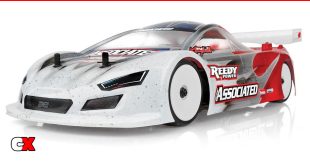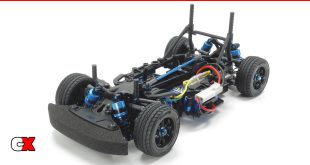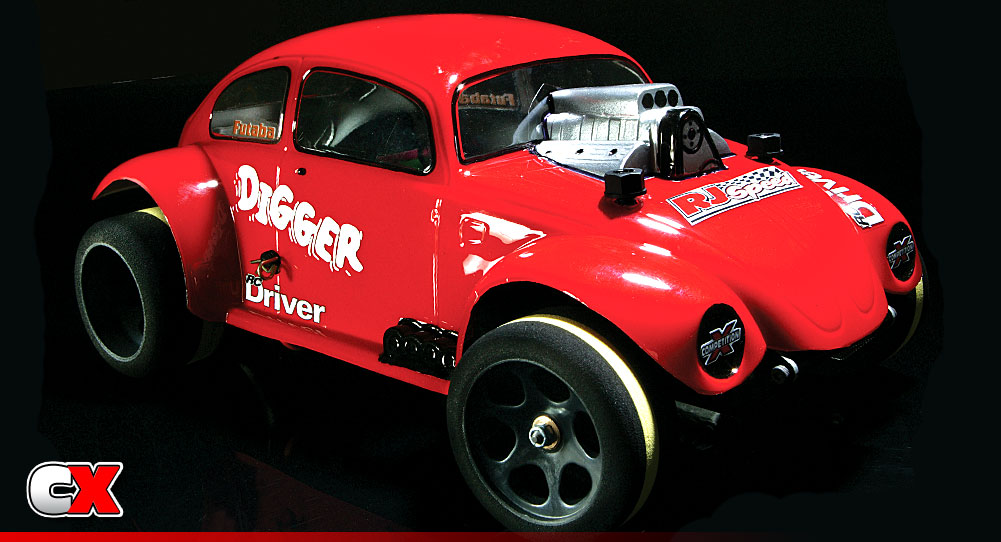
When I started playing with RC cars back in, um, well, a long time ago, my buddy and I actually owned a pair of the Diggers. They were fun cars that we beat up on a daily basis, seeing who could do the longest wheelie and trying to set crazy speed records down our street. Once we found the local track, our little Diggers disappeared into the garage, never to be seen again. I do remember, however, how much fun they were.
Many years have gone by and the Digger has reappeared under a new company, RJ Speed. This little gem is the same as it was back in the day but with a few little tweaks. I received the Digger and was excited to get it up and running. As a twist to the review, I thought how cool it would be to let someone that has never built or driven a RC car enjoy the Digger like I did many years ago. So, I enlisted my girlfriend Danna to open, build, and paint the Digger however she wanted with my adult supervision, of course.
AT A GLANCE
WHO MAKES IT RJ Speed
WHO IT’S FOR Everyone
HOW FAST 22.29mph
PART NO. 2015
HOW MUCH $104.99
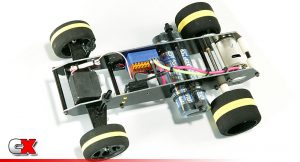 WHAT YOU NEED TO KNOW
WHAT YOU NEED TO KNOW
• The Digger does not have any suspension other than the foam tires (and that’s not much). The front uses a steering block on a steel pin with an adjustable metal link for front toe. The rear is a bushing-supported solid axle (no differential) and comes with a 54 tooth 32 pitch nylon spur gear. Cost and complexity are exchanged for an easy to build, low parts-count vehicle that every new person to RC will appreciate.
• The chassis is quite different than what most of you might be used to. The Digger uses two fiberglass chassis plates held together vertically by a group of aluminum and plastic chassis posts. The fiberglass front axle plate not only keys into the chassis plates to keep it in place, it is also used to mount the servo and front body mounts. Two additional body mounts are attached to the chassis plates and exit out the side of the very cool looking VW Bug body.
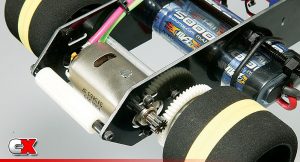 • The motor mount is pretty standard, however I did have to modify it slightly to accept the 540 Mabuchi silver can motor. Any current brushed or brushless motor will fit without a problem, but since Danna has never driven a RC car before, I figured the Mabuchi motor would be more than enough power to get the front wheels up in the air. Speaking of which, the wheelie bar is pretty slick and did get a lot of use during our testing. Danna enjoyed doing wheelies.
• The motor mount is pretty standard, however I did have to modify it slightly to accept the 540 Mabuchi silver can motor. Any current brushed or brushless motor will fit without a problem, but since Danna has never driven a RC car before, I figured the Mabuchi motor would be more than enough power to get the front wheels up in the air. Speaking of which, the wheelie bar is pretty slick and did get a lot of use during our testing. Danna enjoyed doing wheelies.
• The battery is held between the chassis plates by two large, rubber o-rings. Once installed, there is no need to remove it to charge it. If you do have to replace the battery, just slide the o-ring s off and the battery drops out. Pretty simple.
• There is a ton of space for electronics so feel free to drop in any of your older style, monster-size units. If you don’t have any extra electronics lying around, you certainly don’t need to purchase anything high-end for this car. I chose the Duratrax Intellispeed 8T for its size and the fact that, if Danna became a speed-freak, we can drop in any brushed motor up to 8-turns!
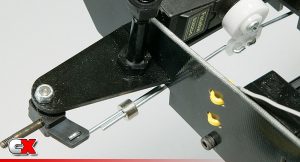 • The VW Bug body really looks cool. Danna kept it simple and chose Pactras Racing Red. Mounting is a little tricky (since you need to mount the rear body posts through the side of the body), so I would suggest marking the holes before you paint. Remember; after you have finished painting, don’t remove the overspray film until you’ve created the body mount holes.
• The VW Bug body really looks cool. Danna kept it simple and chose Pactras Racing Red. Mounting is a little tricky (since you need to mount the rear body posts through the side of the body), so I would suggest marking the holes before you paint. Remember; after you have finished painting, don’t remove the overspray film until you’ve created the body mount holes.
NEEDED TO COMPLETE
– Transmitter and receiver
– Steering servo
– Electronic Speed Control
– Battery pack
– Paint for body
WHAT WE USED
+ Futaba 4PK transmitter w/R603FS receiver—Item no. FUTK4900, $499
+ Futaba S3003 steering servo—FUTM0031, $11
+ DuraTrax Intellispeed 8-turn—DTXM1080, $58
+ Tamiya Mabuchi 540 motor—TAM53689, $16
+ Max Amps 5000mAh battery—MA-5000-6-cell Shotgun, $68
+ Kimbrough servo-saver—114, $5
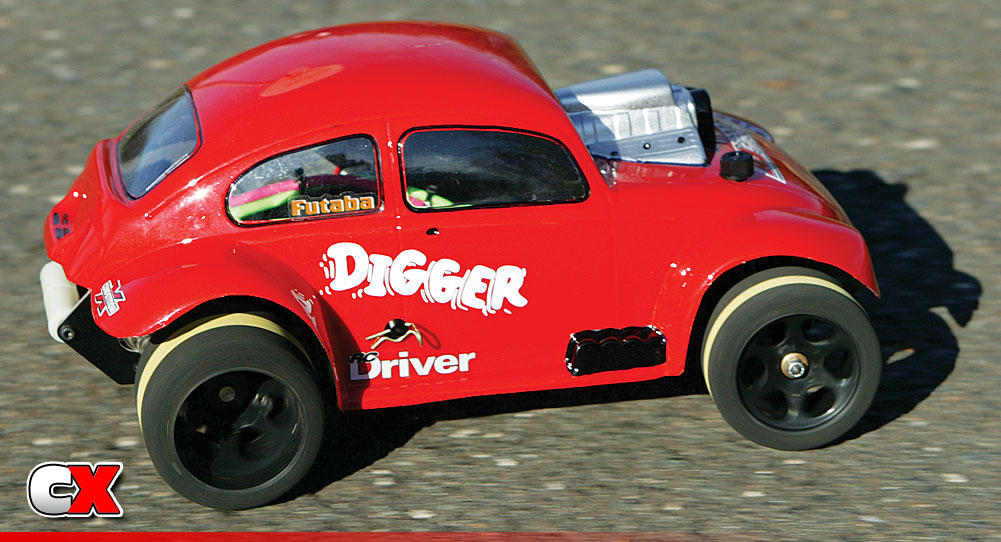
PERFORMANCE SCORECARD
TEST VENUE: School across street from my house in sunny Southern California
CONDITIONS: Paved parking lot
STEERING Understeer
The Digger doesn’t have any suspension, so it relies completely on its foam tires for steering and acceleration. That being said, I was surprised to find that the Digger actually understeered slightly while cornering. I attribute this to the fact that this is basically a wheelie machine, so any throttle input tends to lift the front wheels off the ground and effectively removes any steering. As a precaution, be sure to install some sort of servo saver to help protect the servo gears. We installed a Kimbrough Racing Products servo-saver on my Futaba servo during the build.
BRAKING Good
The DuraTrax ESC gives a nice, smooth braking feel with the Tamiya Mabuchi motor. And there’s extra fun hiding in the braking process—front flips! Accelerate hard enough to get the front end off the ground, keep the Digger in a straight line and mash the brakes! Get it right and you’ll get some pretty comical front rollovers (Danna called them “front flippies”). It should roll back over onto its wheels and be good to go again.
ACCELERATION Excellent
The Mabuchi motor and Max Amps battery provided more than enough power for fun, and anything stronger would result in tons of wheelspin. With a 5000mAh battery, the Digger easily ran for more than 40 minutes per pack. Thanks to the adjustable gearing, we were able to go up one tooth on the pinion for more speed (more speed? See? It’s already happening!). Danna did well with light throttle inputs to get the Digger in a straight line before blasting it past me in a full wheelie-stand!
SUSPENSION None
This is the toughest review category because the Digger doesn’t have any suspension. Could I rate it? It seems to me that the real fun comes from its not having any suspension. If it did have some sort of suspension, it would be in the same category as a lot of other vehicles, but at a lower price. The Digger’s fun-factor comes from what it can do because it doesn’t have suspension—wheelies, cartwheels and “flippies.”
DURABILITY Excellent
This is the easiest category for me to rate, and I didn’t even get to drive the Speed Digger much! Danna put the Digger though a very rigorous workout with flips, rollovers, wheelies and crashes. A few small chunks came out of the tires, and the body showed some serious road rash, but everything under the VW shell was in perfect condition. The Digger’s simple design means fewer parts to break.
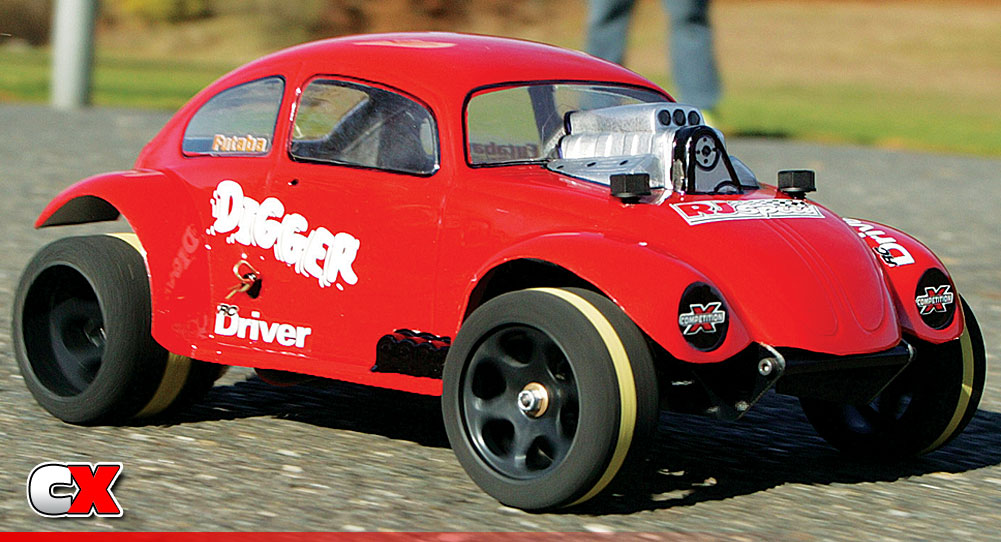
DIMENSIONS
LENGTH: 12 in. (305mm)
WIDTH: 8.25 in. (209.5mm)
WHEELBASE: 8 in. (203mm)
WHAT WE LIKED
• Simple design
• Accepts almost all levels of electronics
• High-grip foam tires
• Extremely durable
• Inexpensive
• Looks cool!
• Great for beginners
WHAT COULD BE IMPROVED
• Instructions are a little vague for inexperienced builders
THE LAST WORD
While Danna was putting on a show for a few local kids, I had time to sit back, watch and relive the time when I had my first Digger. Seeing Danna smile and all the kids laughing and having a good time reminded me that RC is supposed to be fun and not all about racing and prizes. We drove the Digger for two battery packs (OK; she drove one full pack and 75% of the other one) doing wheelies, backflips, front flips and just generally bashing. Danna had a great time and thought that it was the perfect learner’s car for her. In the end, that’s what the Digger is meant for! And I think it hits the mark perfectly. “Danna, can I drive now?”.
Links
RJ Speed, www.rjspeed.com
Futaba, www.futaba-rc.com
Duratrax, www.duratrax.com
MaxAmps, www.maxamps.com
Kimbrough Racing Products, www.kimbroughracingproducts.com
 CompetitionX CompetitionX is the most up-to-date source for RC Car News, Reviews and Videos for Radio Control. We also have the most comprehensive Manual Database on the web.
CompetitionX CompetitionX is the most up-to-date source for RC Car News, Reviews and Videos for Radio Control. We also have the most comprehensive Manual Database on the web.
